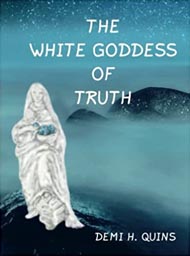The White Goddes of Truth
Demi H. Quins
Published by Mybestseller.co.uk, 2022
A large format book with nearly 600 pages packed with information that
had never before reached the general public. Through this book Quins gives
the ancient pagans a voice again and reveals a conspiracy that is unparalleled!
After a violent storm in January 1647 in the Netherlands, votive stones and altars
with texts and reliefs referring to an unknown goddess named Nehalennia were
found on a beach in Zeeland. It was, and still is, incorrectly
maintained in history that she was a goddess who belonged to a local cult. This
happened not only because of the tunnel vision of researchers, but also because
information was demonstrably and consciously withheld. As a result, Nehalennia
acquired the stature of a legend about which mainly fairytale-like stories were shared.
Demi H. Quins, a writer and researcher, discovered, after moving to southern
France, that this goddess was also no stranger in the Pyrenees. She decided to
follow the traces of those who had revered Nehalennia as their Goddess of Light
and started to unearth her true nature. Over the following two years it led to the
examination of hundreds of archived literary sources.
Why was this ancient religion demonised while these teachings offered people freedom
and peace? Quins reveals the methods used throughout history to bury Nehalennia and
persecute those who followed her. She fount out that this goddess was knows all over
the world and is still revered in some remote places. She has experienced herself that
Nehalennia can still be contacted. As she immersed herself in this religion, the power
of the light provided her with an increasing amount of information.
An ongoing power-struggle continues to rage that started millennia ago, and the battle
described here between dark and light, is still surprisingly relevant. Quins says
Nehalennia is the key we require to make the Earth a radiant place again.
The Dutch-born Demi Quins investigates with great interest the hidden voices
of those who refused to be lectured by rulers and Christian preachers.
She lives with her husband Hendrik on a mountai in a French hamlet in the Pyrenees.
She regularly goes out to do research in the region and in archives.
(The text above comes from the back of the book)



